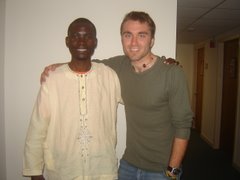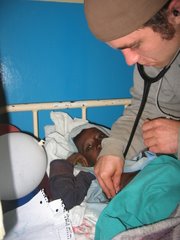Saturday 5 May, 2007 – 08:03 – Dar es Salaam, Tanzania
The laptop beneath my fingers seems to have slowly taken on a strange feel, having not written much since coming to Tanzania. There are many stories, but at the end they all come down to the same fundamental links: the depth of poverty, the vast and widening expanse between haves and have-nots and the signs of grotesque inhumanity. From the standpoint of shock value, these are awfully fascinating to discover at first. Then they become fascinatingly awful as understanding sets in. Newness wears out and intrigue decays until one looks at reality and sees it as just plain awful. When you get to that point, you don’t feel like writing.
I caught a lift into town a few weeks ago from a lovely older woman who turned out to be Tanzania’s only female oncologist. In a short period of time we covered a lot of ground and suddenly the day’s shakedown switched around so as to first accommodate a walk through the hospital before continuing on with my already made plans.
Her office is a crumbling cubicle, and on the wall hangs what looks like an engine block – a light box to read X-rays. Coming from fancy American clinics, however, one would never believe its functionality until seeing the ancient beast in action. Dispersed throughout the long hallway outside her office lay approximately 70 patients, all hers, all to be seen that day. This is the African waiting room. No chairs, no Dixie cups or water jugs, no secretary to complain to. There are no queues, meaning no apparent order, and yet there is no disorder. Patients just wait. Some stand, leaning against pillars. Others spread their grass-woven mats out along the floor, wrap themselves up in an assortment of colorful blankets, and sleep for hours. And still others sit in the middle of the walkway, all with straight backs and right angles at their waists, sort of as if they were leaning against a wall – except that they are not, and not at all as if they were leaning against a wall as you might imagine. When Westerners lean against walls, our backs still curve; we don’t actually put our butts snug to the corner but rather sit a few inches away and lean back to rest on our shoulders. Africans are all about the right angle, and because they’re comfortable without a wall to lean against, the distribution of bodies in the “waiting room” is pretty homogenous. So when you picture this hallway, don’t just put bodies on the sides, imagining there is a straight, narrow width that runs down the middle of the hallway where you could walk – because it’s not there. But also when you imagine what this place must be like, don’t add noise – don’t add complaining and don’t even add crying babies, because although they are dying, these people wait patiently. Time is elastic in Africa and few keep it, because few have reason to keep it.
That was the outpatient wing. The inpatient section was much like the other hospital I described a few months ago in Rwanda – more patients than beds, some sleeping on the floor. My friend introduced me to a woman from the Comoros Islands. How she got to the mainland nobody knows because she is too poor to cross the ocean by herself. The doctor found her dying in the streets, already a bilateral mastectomy patient – although maybe patient is not the right word, because that implies some sort of continuity of care. When she undraped her bed sheet I nearly gasped. Of course I could not be emotional in front of her, because that would be unprofessional, and she needed every ounce of hope that could possibly be fused in her mutilated body. Her breasts were previously removed, Lord knows where, but it looked like this was done in more of a butcher shop and less of a clinic. Most sadly, not all the cancer had been removed. When she returned to the street the disease spread – everywhere, and that’s when the doctor who gave me a lift found her.
Moving on. It started to rain heavily, and the lesser-sick patients ran outdoors with large 30-gallon plastic jugs to collect drinking water from the roofs. If you have not already done so, pause for a moment and picture what that looks like.
As we left, the oncologist softly spoke some understanding words, “I think you have seen a lot today. You will have a lot to write about”. I nodded, still trying to process it all. Yeah it is a lot to write about, but it is poison that I’ve already choked down. And there are lots of these poisons everyday – kids without shoes, piles of burning trash in ditches, flood waters from the African rains that wreak havoc everywhere. So the next question is what can I do about these bludgeoning realities? I don’t have any answers yet, other than to say I’m hungrier now than ever before to get back to the classroom and continue my education. Einstein claimed he was not inherently different from anyone else and that he had no intellectual super powers that were not also available to the rest of the world. What set him apart, he said, was that he never quit. He never stopped thinking about how to get answers – and could even sit in a chair for two or three days, staring at a problem until he made headway. Perhaps the next few years of education, through the lens of these experiences, will be that chair for me.
One of the most shocking truths I’ve discovered in my return trip to Africa is the universality of ignorance. Recall that last year I spent some months in rural Kenya where the warriors my age wore feathers in their hair, and a noticeable percentage of the patients were nomads who had walked upwards of 80km through the desert for health care. It was the fantasy - everything we romanticize about Africa. But it left me with an unbalanced understanding of the region. In the bush, by necessity of survival, people knew each other and wealth was fairly evenly shared. Maybe the chief owned four times as many cows as the average man, which seems like a big deal when you live within the parameters of that life – but step back to look at it from the standpoint of urban wealth and that is merely splitting hairs.
In urban regions there is a disgusting discrepancy between rich and poor. People neither understand each other nor care to understand each other. Previously I believed that only the West cared so little about the present state of pain and suffering of other humans in the world – but it is every bit as present in Africa as well. Many here have no idea what life is like for the majority, nor do they care to ever let their children step foot down the muddy places people in the Swahili parts calls streets. They live in fancy houses behind big fences and pay much less than they can afford to a handful who tend their gardens and guard their houses. And these are Africans I’m talking about, not just expatriates. How could there be Africans who didn’t know Africa? Growing up, I remember whenever food was left on a plate inevitably someone would say, “There are people starving in Africa and you aren’t going to finish your food!?”. The snotty response every vegetable-wary child rattled back was an order to box their leftovers up and ship them over. This extravagant life is indeed hard to swallow, but what pains me about humanity even more is that people are not starving because of any shortage of food – they are starving because all the food is at their neighbor’s, who unfortunately don’t give a damn.
But just because I’ve made this analysis does not mean I am immune from the same ignorance. Over my weeks in Tanzania I have become good friends with a white Zimbabwean who wants to know how I can be so curious about Africans and know so little about Native Americans. I don’t have any good answers to give him and must settle for realizing my own ignorance.
There are loads of beautiful things here: shimmering sunsets, sparkling children, and wonderful landscapes – and I could write pages of analogies, using brilliant adjectives to paint fantastic pictures for your minds to visit, but I don’t see the point in getting all romantic about them. Here are some things I have enjoyed, however.
To greet someone who is of an older age set, one says shikamoo, meaning “accept my blessing”. The response is marhaba: “blessing accepted”. When children use Shikamoo, adults stoop down so the young ones, who have already eagerly raised their hands, can touch their elder’s forehead, a physical gesture of blessings being passed.
The word for bird, ndege, is the same word for airplane. Imagine how that came to be.
And speaking of language, rangi means color. Example: rangi nyekundu is red, or literally the ‘color red’. Now hang with me for a little bit. The suffix adjective –zee means old, and putting an m in front implies it belongs to a person, so mzee is an elder. Alright, one more step before putting it all together – damu is the word for blood. I already told you how to say ‘red’, but now comes ‘maroon’ – rangi ya damu ya mzee – or literally, the color of an old man’s blood. That’s pretty sweet.
As bumpy and painfully uncomfortable as un-graded dirt roads outside the city are, there is something nice about imperfection – something that causes you to appreciate other things in life that might otherwise be taken for granted, and something which I will miss when I am home.
Each night I fall asleep to the sound of waves from the Indian Ocean that lap against the shore – nothing quite like that in Iowa.
Although they can be incredibly uncompassionate toward each other, people here cannot be faulted for any lack of hospitality. Having a guest is more than an honor, and there is no concept of over-staying one’s welcome. It is, however, possible to under-stay your time, which becomes obvious if you try to leave after only staying in someone’s house for a week.
See you in a few weeks-
BJFH
Ps. Something of potential interest. Whereas pregnant women in the West tend to crave chocolate, pregnant women in Tanzania crave Udungo – which is dirt, caked together and rolled into a rod-like shape. It is fine, not too course, and tastes like a dusty road.
Sunday, May 27, 2007
Subscribe to:
Post Comments (Atom)



No comments:
Post a Comment